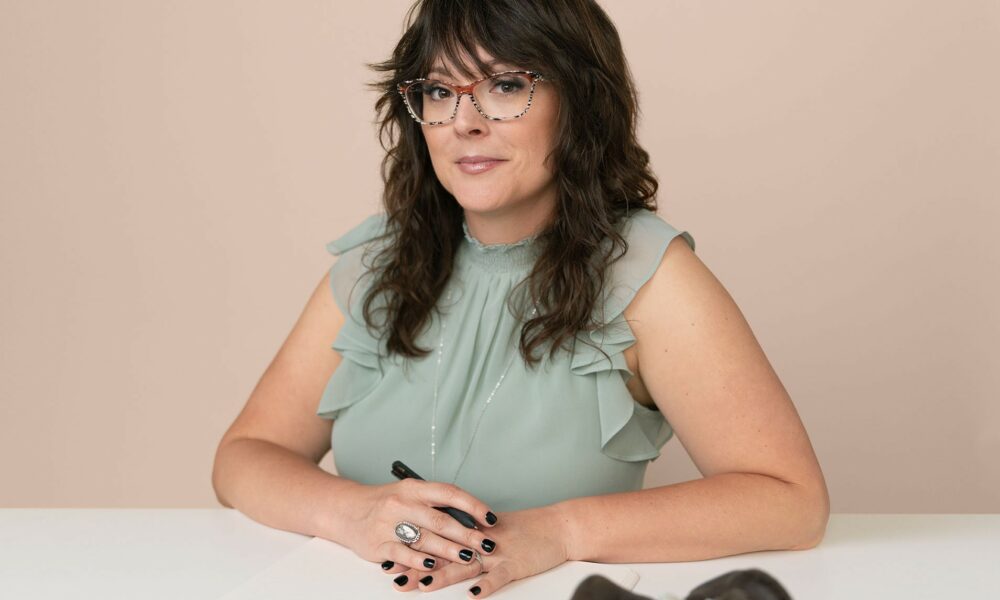

Today we’d like to introduce you to Brandi Fleck.
Hi Brandi, thanks for sharing your story with us. To start, maybe you can tell our readers some of your backstory.
Becoming a life coach and opening practice was a complete career change for me at nearly 40 years old. It took me a long time to accept the fact that I could do it, but I did and I’m so glad I’m showing up as authentically as I am today.
I opened Brandi Fleck Coaching in 2023 after working in the corporate world for most of my professional writing and art career and then completing a four-year stint as an independent podcast producer and host.
Even though my path into life coaching has been a slow and winding one, I wouldn’t change it. Because things happened the way they did, I met many people who inspired and impacted me, which ultimately led to this career change and a boost to my quality of life.
I’ve been a professional artist since 2001 and a professional writer since 2005. Fast forward to 2017, I had just gone through a divorce and custody battle and was barely holding it together mentally and emotionally.
Out of nowhere, a friend emailed, told me he’d gone back to school to become a life coach, and offered to coach me for free to get his experience hours in. I had no idea what life coaching was or how it could help, but it felt like a divine intervention and I accepted his gracious offer.
I’m glad I did because it changed my life. It was in those first coaching sessions I ever had that I identified what love was to me and how to get more of it in my life. And man did I need more love back then. I started painting again, which is something I’d let go by the wayside while I was married (the first time) and I also launched my indie podcast, Human Amplified®. I felt like I was coming home to myself.
Fast forward to 2020 during the beginning of the pandemic — it was time for coaching again, but this time, business coaching to turn the podcast into a true business. Your Coach Meg, based in St. Louis, MO, really helped me lean into my authenticity, confidence, and strengths, resulting in a brand that was, I’ll say, badass. It was a success in many ways.
Those two coaches laid the foundation that taught me how powerful coaching could be. I’d seen it in my own life. And even though they weren’t trauma recovery coaches, it was a healing process in a lot of ways. Hosting and producing the podcast was also healing for myself and my guests. They were telling their beautiful and messy life stories with one thing in common — trauma.
During those years the thought that I could be a life coach kept crossing my mind, but I ignored it, even though I knew I needed to make a bigger change than the ones I’d already been making. So I kept my eyes open for programs that felt right — they ranged in topic from mediumship and reiki to nutrition. Each one I considered was some sort of healing modality, but I wasn’t willing to commit.
Then I found it. It was 2022 at this point and I haphazardly came across an International Coaching Federation (ICF)-accredited program, with Canadian-based Moving the Human Spirit, to become certified in trauma-informed coaching. I knew immediately this was my program, even though I didn’t know what the future would look like after it.
Amid the uncertainty that started to arise around my podcast and with the valuable support of my now husband and family, I started.
Alright, so let’s dig a little deeper into the story – has it been an easy path overall and if not, what were the challenges you’ve had to overcome?
Yes, there have been some struggles along the way. For instance, I decided to stop podcasting to fully focus on trauma-informed coaching. That was an incredibly tough choice to make.
But, to be clear, the struggle doesn’t have to automatically equal suffering. I haven’t suffered from starting my own coaching practice. Instead, I’ve grown and blossomed in a beautiful way and I’m grateful for all of it.
During the struggle to decide if I should stop podcasting, I was experiencing debilitating anxiety. The anxiety was a guidepost for me telling me something was wrong. I started to listen. When I chose to listen to my body and chose it over the podcast, I was able to prove to my body that I care and to my mind and spirit that I’m here for me — I was no longer willing to sacrifice my personal health to chase my dreams. I learned that health and energy are what make you able to chase your dreams, even if it takes a little longer. Out of that struggle, good health became a dream and value all on its own too.
By the end of the pandemic, when the choice to end the podcast was coming up, I was experiencing autonomic dysfunction as well. My crude understanding of it is it’s where the parasympathetic and sympathetic parts of your nervous system are fighting, which impacts your involuntary bodily functions. My heart rate was skyrocketing and then bottoming out. My blood pressure was doing the same. I felt dizzy and nauseated for the majority of a six-month period. My body was riddled with inflammation and inflammatory responses, including pain.
I learned during my trauma-informed coaching training that this can actually be a result of experiencing trauma. No doctor I had visited looking for answers in the previous six months had mentioned that and I didn’t know to ask. Thanks to Moving the Human Spirit, I became educated and was able to start reversing the issues.
They’re 99% resolved now. (Through meditation, breath work, grounding, nutrition, movement, and without the use of medication).
Not only did choosing the path to become a trauma-informed certified coach change my career and allow me to serve others, but I believe it increased the quality of my own life so that I can even have the health and energy to do that. It really saved me from a life of suffering and enabled me to do that for others as well. Wow. What a blessing.
Ultimately, this personal health struggle that showed up as a result of my own complex trauma (as a child and adult) has led to deep insights about what my clients are going through too, even if no one else believes them or understands them completely. Even if I can’t experience their unique circumstances, I know what a dysregulated nervous system feels like and the symptoms it can cause.
It was also cemented for me that the difference between being on the “right” path and the “wrong” path is alignment. When you’re on a path that’s aligned with your purpose, values, and highest good, even if there’s a struggle, doors open. The struggle doesn’t seem as much like a struggle. And on the rare occasion it does, you feel more equipped to handle it.
I certainly do.
As you know, we’re big fans of Brandi Fleck Coaching. For our readers who might not be as familiar what can you tell them about the brand?
I’m a trauma-informed certified life coach specializing in trauma recovery coaching, offering virtual one-on-one coaching sessions to clients. I’m a member of the Global International Coaching Federation (ICF) and its Tennessee chapter.
I work with trauma survivors who, like my past self, experience repeating negative patterns in relationships, careers, spirituality, health, and other life areas due to family of origin wounds stemming from emotional and mental abuse. In a safe and confidential space, my clients and I partner to co-create self-awareness and emotional regulation to self-heal and move forward in new and exciting ways that are in alignment with the client’s own, authentic humanity. We do this through a lot of questions, exercises, observing patterns, exploration, and even play.
My clients know me for my gentle coaching presence, kindness, compassion, and non-judgmental approach.
When a client starts one-on-one coaching with me, they typically go through an intake process, a custom program design and review, and then we start working on the program that’s tailored to their needs. Program length starts at 3 months but can last a year or more if needed. How much time is needed depends on the person, but this is definitely a paced-out process that takes time.
Trauma-informed coaching is different from therapy or counseling as it’s completely non-clinical. That’s an important distinction — I don’t diagnose, treat, or prescribe. I’m not a licensed medical professional. I do love the licensed professionals and our work can complement one another’s. However, when you come to coaching, it’s based on the principle that you are truly whole and have all the answers within, even if you’ve been diagnosed with certain mental illnesses. We just need to find the answers within, together. In the session, you lead while I hold the guideposts for the journey.
What sets me apart from others is that being a lifelong creative before becoming a coach helps me be curious about my clients and co-create positive change with them in a unique way.
For instance, my previous career in writing is quickly becoming a major part of what I offer to clients. A lot of coaches are taught not to take many notes in session or to encourage the client to take notes instead. But I find that my clients are going so deeply inward to verbally process experiences and emotions if they had to stop to take notes, that would take them out of their exploration and play in a lot of cases.
Of course, there are great benefits to the client writing as well and they have the choice to do that too. But I’m going to be processing the session through writing regardless because that’s how my brain works. This results in what I generically call email summaries, which some other coaches do provide, but mine are extremely thorough.
Many times when clients first come to me, they’re spending so much time in fight or flight that remembering recent conversations and processing them at the moment can be a struggle. We find ways over time to regulate the nervous system and calm that trauma or stress response, but in the meantime, the session summaries allow the client to remember the connections they made in the session and to continue processing their self-discoveries outside of the session. It also enables them to remember and not doubt their progress. That’s motivating to keep doing work outside of the session.
The email summaries also give the client a really important opportunity to receive trauma education outside of the session. In the session, I’m totally focused on coaching. That’s really important for the client. But it’s also really important for the client to learn about the impacts of trauma to understand why they do the things they do and to also understand how what they did in session relates to their progress and healing. This has proven to be very comforting and validating for my clients.
All of my clients so far have proactively mentioned how helpful these email summaries are.
I also have years of experience actively listening to others’ traumatic experiences, seeing and accepting people for who they are as they are, meeting them where they’re at to hold space, giving people an outlet for self-reflection and catharsis, and handling sensitive topics with care.
It all combines to create my own coaching style and approach.
So, before we go, how can our readers or others connect or collaborate with you? How can they support you?
As a newer coach, one of the best ways you can support me is to follow me on Instagram and Facebook (@brandifleckcoaching) and then engage with and share my posts.
Organic exposure is so valuable to me right now. Even if you aren’t looking for a coach, by following me on socials, you’ll get some amazing educational snippets, inspiration, and even regular coaching questions that you can think about and journal about to expand your self-awareness.
If you like what you see and hear, recommend my services to your friends, or even write a Google review!
If you do think trauma-informed life coaching or trauma recovery coaching could be helpful to you, schedule a free consultation through my website to learn more, ask all your questions, and tell me what you’re looking for in a coach and what you want out of coaching. If we both think we’re a good fit, we’ll get started!
If you’re a trauma survivor and know you need healing but aren’t even sure where to start, still schedule a free consultation with me. If I’m not fit for you, I’m happy to find someone who is or some other healing modality that may be a better fit. My ultimate goal is to give you the support you need.
In terms of collaborating, I love meeting other wellness practitioners, coaches, therapists, or anyone in the healing arts to who I can refer my clients when needed and vice versa.
That’s because healing trauma can have a lot of moving parts and pieces. No one approach will likely cover every area needing attention in the mind, body, and spirit, so I encourage my clients to take a holistic approach, assembling their unique support team for healing trauma. I love to help them assemble that team when they need it and referrals are a huge part of that.
Plus, deepening our relationships together as wellness practitioners and healers not only helps our clients, because we can consult with one another and plan ways to support them together, but it helps us too in our own growth and ability to connect as humans with common goals —actual relationship building rather than just “networking” and certainly not competing.
There’s enough room for all of us. Yeah!
Pricing:
- 30-minute, virtual consultation – free
- Sample coaching with me in a virtual, 60-minute Coffee Coaching Session – $3.25
- 60-minute coaching session – $125
Contact Info:
- Website: https://www.brandifleckcoaching.com
- Instagram: https://www.instagram.com/brandifleckcoaching
- Facebook: https://www.facebook.com/brandifleckcoaching
- Linkedin: https://www.linkedin.com/in/brandifleck
- Youtube: https://www.youtube.com/@brandifleckcoaching
- Other: https://www.facebook.com/brandi.fleck, https://www.etsy.com/shop/ArtbyBrandiFleck




 Image Credits
Image Credits
Keturah Bishop












